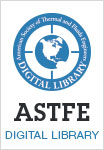
ISSN Online: 2379-1748
8th Thermal and Fluids Engineering Conference (TFEC)
PERFORMANCE ANALYSIS OF NON-GRAY RADIATION MODELS SLW AND WSGG AT THE LIMIT OF SMALLEST COMPUTATIONAL COST
Abstract
One of the main challenges in the computation of the thermal radiation is high computational cost of solving the radiative transfer equation (RTE) based on spectral data. This spectrally accurate approach, known as line-by-line (LBL) method, serves as a benchmark for many radiation models which aim to solve radiation heat transfer with a limited number of RTEs. The aim of this study is to evaluate the prediction accuracy of radiation models compared to their computation cost. The relative performance of Rank Correlated Spectral Line Weighted sum of gray gas (RC-SLW) and Weighted Sum of Gray Gas (WSGG) models are compared with benchmark solutions derived from LBL method. The study focuses on the accuracy and performance
capability of each model in different circumstances, which are represented by a series of example problems where that progressively become more complex. The results from the one-dimensional gas mixture slab simulations points out to the fact that no model performed consistently better compared to the other one. The relative complexity of RC-SLW model has not assisted its performance in the case of lower number of RTE's. In more complex case with non-homogeneous species concentration and high temperature gradient, RC-SLW was found to be superior at predicting the radiative heat source at colder regions even without tuning the reference temperature of the model